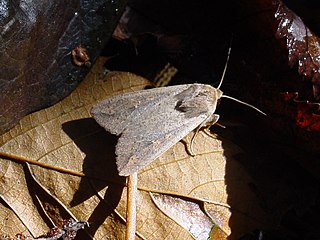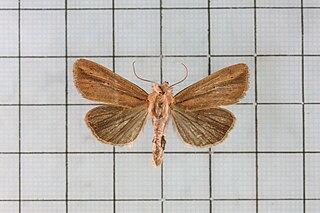
Mythimna ferrago, the clay, is a moth of the family Noctuidae. The species was first described by Johan Christian Fabricius in 1787. It is distributed throughout Europe and is also found in Morocco, Algeria, Turkey, Asia Minor, Armenia, Syria, Turkestan, Israel, Lebanon, Iraq, Iran, Central Asia and the western parts of temperate North Asia. Also Tibet.

Mythimna impura, the smoky wainscot, is a moth of the family Noctuidae. The species was first described by Jacob Hübner in 1808. It is distributed throughout most of the Palearctic realm from Ireland in the west of Europe east to the Caucasus, Turkey, Syria, Kazakhstan, Russia, Siberia, Mongolia, then Japan. In Europe it is found from the Arctic Circle to Spain and Italy in the south, as well as in the northern regions of Greece.

Mythimna pallens, the common wainscot, is a moth of the family Noctuidae distributed throughout the Palearctic realm from Ireland in the west, through Europe to Central Asia and Amur to the Kuriles in the east. The species was first described by Carl Linnaeus in his 1758 10th edition of Systema Naturae.

Mythimna is a genus of moths in the family Noctuidae described by Ferdinand Ochsenheimer in 1816.

The Mythimnini are a small tribe of moths in the Hadeninae subfamily. As numerous hadenine genera have not yet been assigned to a tribe, the genus list is preliminary.
Wainscot is a wooden panelling applied to an interior wall.

Mythimna unipuncta, the true armyworm moth, white-speck moth, common armyworm or rice armyworm, is a nocturnal agricultural pest belonging to the family Noctuidae. This moth is also commonly referred to by the scientific name Pseudaletia unipuncta. The species was first described by Adrian Hardy Haworth in 1809. Mythimna unipuncta is found in the Americas and in parts of Europe, Africa and Asia. Its original distribution is North and South America. It has been introduced to other places from there. They are known as armyworms because the caterpillars move in lines as a massive group, like an army, from field to field, damaging crops.

Mythimna vitellina, the delicate, is a moth of the family Noctuidae. The species was first described by Jacob Hübner in 1808. It is mainly distributed throughout southern Europe and the southern part of eastern Europe. It is also found far less commonly further north in Europe. Also in North Africa, the Near East and Middle East, Central Asia and western China.

Mythimna straminea, the southern wainscot, is a moth of the family Noctuidae. The species was first described by Georg Friedrich Treitschke in 1825. It is found in the western parts of the Palearctic realm, including Morocco, Europe, Turkey, the Caucasus, Israel, and Lebanon.

Mythimna separata, the northern armyworm, oriental armyworm or rice ear-cutting caterpillar, is a moth of the family Noctuidae. It is found in China, Japan, South-east Asia, India, eastern Australia, New Zealand, and some Pacific islands. It is one of the major pests of maize in Asia. The species was first described by Francis Walker in 1865.

Mythimna albomarginata is a moth in the family Noctuidae. It is found in the Philippines, Borneo, Java and Taiwan.

Mythimna pallidicosta is a moth in the family Noctuidae first described by George Hampson in 1894. It is found from north-eastern India to western China, Sri Lanka, Taiwan, Sundaland, Flores, the Philippines and Japan.
Mythimna borbonensis is a moth in the family Noctuidae. It is found in Réunion and Mauritius.
Mythimna sequax, the wheat armyworm, is a species of cutworm or dart moth in the family Noctuidae.

Mythimna oxygala, the lesser wainscot, is a species of cutworm or dart moth in the family Noctuidae.
Mythimna denticula, or Mythimna (Mythimna) denticula, is a moth of the family Noctuidae first described by George Hampson in 1893. It is found in Sri Lanka.











